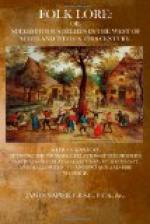Until the funeral, it was the practice for some of the relations or friends to sit up all night, and watch the corpse. In my young days this duty was generally undertaken by youths, male and female friends, who volunteered their services; but these watchings were not accompanied by the unseemly revelries which were common in Scotland in earlier times, or as are still practised in Ireland. The company sitting up with the corpse generally numbered from two to six, although I have myself been one of ten. They went to the house about ten in the evening, and before the relations went to bed each received a glass of spirits; about midnight there was a refreshment of tea or ale and bread, and the same in the morning, when the relations of the deceased relieved the watchers. Although during these night sittings nothing unbefitting the solemnity of the occasion was done, the circumstances of the meeting gave opportunity for love-making. The first portion of the night was generally passed in reading,—some one reading aloud for the benefit of the company, afterwards they got to story-telling, the stories being generally of a ghostly description, producing such a weird feeling, that most of the company durst hardly look behind them for terror, and would start at the slightest noise. I have seen some so affected by this fear that they would not venture to the door alone if the morning was dark. These watchings of the dead were no doubt efficacious in perpetuating superstitious ideas.
The reasons given for watching the corpse differed in different localities. The practice is still observed, I believe, in some places; but probably now it is more the result of habit—a custom followed without any basis of definite belief, and merely as a mark of respect for the dead; but in former times, and within this century, it was firmly held that if the corpse were not watched, the devil would carry off the body, and many stories were current of such an awful result having happened. One such story was told me by a person who had received the story from a person who was present at the wake where the occurrence happened. I thus got it




